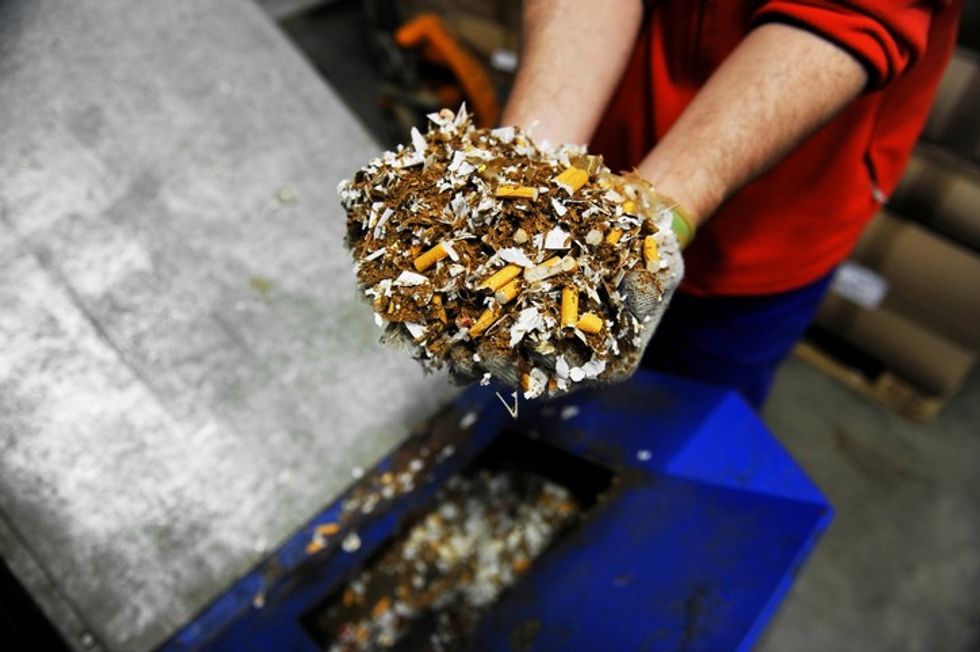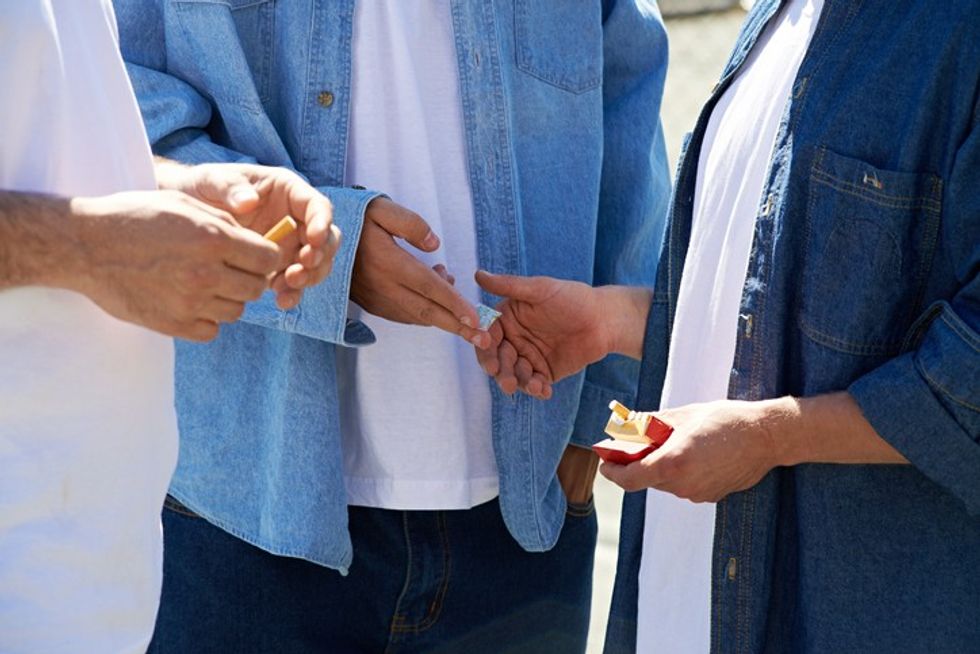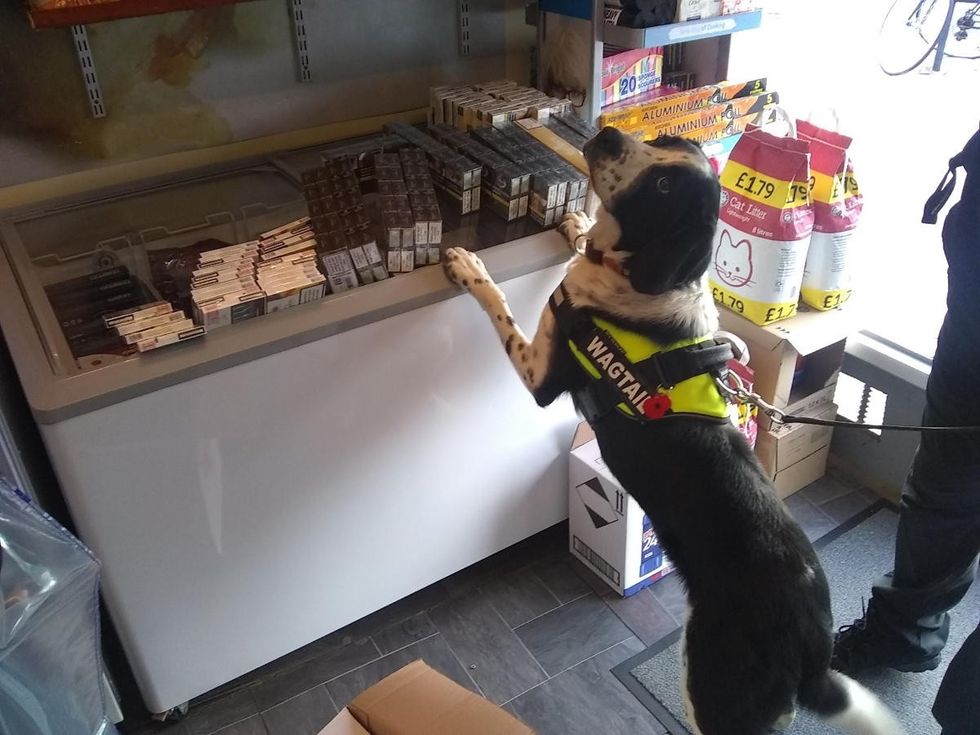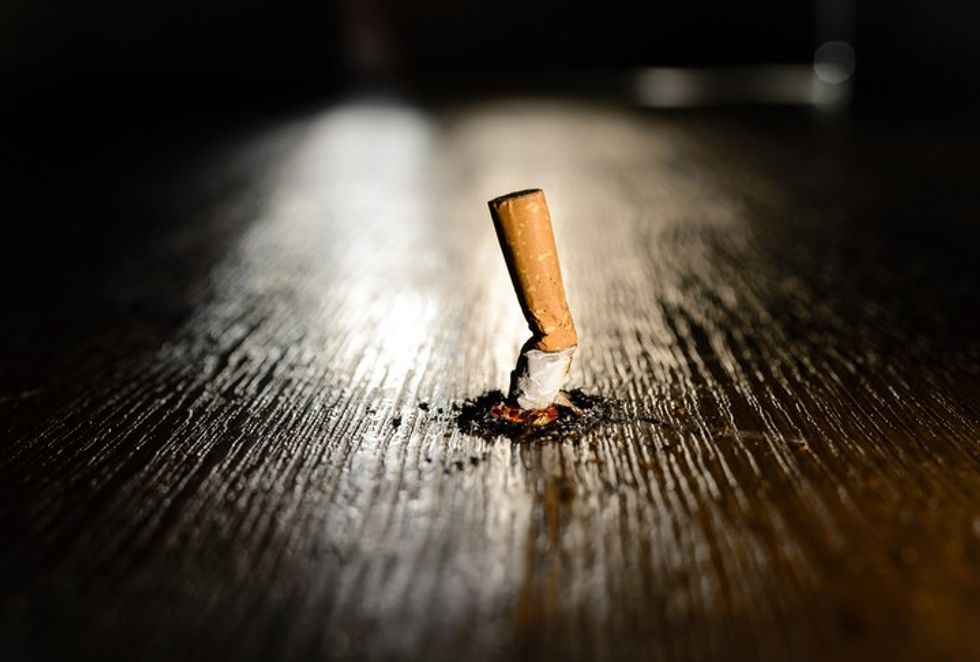Though the sale of illegal tobacco has reduced in recent years, it still seems to be like an albatross around the neck of the tobacco industry, something which cannot be shrugged off easily, no matter how hard it tries.
Illegal tobacco can take many different forms and there can be regional variations in the names that it is given- illicit tobacco, cheap cigarettes, fake cigarettes to name a few.
According to the World Bank, the global trade in illicit tobacco is worth billions each year, with the profits going to the criminal groups who produce, manufacture, smuggle, distribute and sell tobacco products on which there is no tax duty paid, nor there is any control over ingredients and quality.
As per a report titled “Illegal Factories In Europe During COVID” by Global Tobacco & Nicotine Forum (GTNF), there are about 34 illegal factories in Europe, eight among which are in Austria alone.
Although UK government data shows the estimated amount of illegal cigarettes consumed has reduced by half from 5 billion illicit sticks in 2010 to 2.5 billion in 2019, the problem still persists, costing the taxpayer an estimated £2.2 billion a year.
Ian Howell- Director of Fiscal and Regulatory Affairs, Japan Tobacco International (JTI), also feels that the menace of illicit tobacco still exists.
“Research conducted for JTI shows that, despite lockdown and travel restrictions, over 30 per cent of smokers are still able to purchase tobacco that was not subject to UK taxes. Therefore, it still remains a serious problem and takes revenue away from legitimate retailers, facilitates the supply of tobacco to underage people, and supports organised criminal networks.
“The government estimates that close to £49 billion in tax revenue has been lost through tobacco smuggling since 2000,” Howell told Asian Trader.
JTI, Imperial Tobacco and other leading tobacco companies are known to regularly undertake test-purchasings to identify retailers that are selling illegal tobacco. The info is then passed on to law enforcement agencies and local councils after which corrective actions are taken, that include imposing fines and cancellation of trading license.
Is pricing the real issue?
Superficially, pricing seems to be the key here. Since illicit cigarettes are available at £4 and £6 as compared to legit cigarettes that are priced at £10 to £12, it is no-brainer that these sell like hot cakes.
One in six Briton switched to consuming illegal tobacco during 2020’s Covid-19 lockdown owing to high prices and availability of cheaper versions, claims the recent report by A&M.
Not only do they cost cheaper, they offer better margins to retailers as well.
“Not only are these illegal ciggies available at half the prices, they have better margins too for retailers and store-owners. If I get five pence on a legal £10 cigarette pack, the store owner selling illicit packs makes £1-2 on every £4-pack,” a Bolton-based retailer told Asian Trader on condition of anonymity, adding that it looks like a “win-win model for both retailers and consumers.
However, the cheaper version sold at “pocket money prices” entices young adults and teens to try smoking. Latest figures from Keep It Out claims that more than seven out of 10 children aged 14-17 who smoke (74 per cent) have been offered illegal cigarettes and half (49 per cent) end up buying them.
Also, these cigarettes often lack the ability to self-extinguish, if left unsmoked, posing a fire risk. Plus, since they are unregulated, there is no way of knowing what harmful ingredients they contain. Not to forget the strong links to low-level and large-scale organized crime.
James Hall, Anti-Illicit Trade Manager- Imperial Tobacco UK, acknowledges that illicit tobacco has deep roots in other criminal activities.

“There is a misconception that buying “cheap cigarettes” is akin to a Robin Hood crime, but it is not. Illicit tobacco traders often have links to other criminal activities and in the worst cases, the money raised from sales of these “cheap cigarettes” can go toward funding other illegal operations such as human trafficking and modern day slavery,” Hall told Asian Trader.
On the other hand, the rising price of legal cigarettes are often pointed out as one of the root causes since prices have risen faster than growth in incomes over the last five years, primarily due to taxation.
Another Bolton-based retailer, however, does not blame cigarette companies for keeping higher prices, saying they can’t do much here as “their hands are tied”.
“Even if they lower the prices, they won’t be able to match half the prices at which ‘cheap cigarettes’ are available easily in Bolton and other areas,” he told Asian Trader.
Bolton under the lens
Within the UK, northern parts are more notorious when it comes to this illegal trader. A report by KPMG has found that illegal cigarettes are a bigger problem in the north east of England than other parts of the UK.
The report released last month, which was commissioned by cigarette manufacturer Philip Morris, said that Yorkshire and the Humber are also among the worst-hit regions for illicit sales.
JTI has also mentioned in a report in November last year that about 61 per cent of stores in the Bolton area keep illicit tobacco for sale. While packs of illegal cigarettes were on sale for as little as £4.50, almost half the price of the cheapest legal product, counterfeit 50g packs were found to be at £5 – around one fifth of the price of the genuine product, as per the report.
“We completed a series of test purchases in Bolton this year, which revealed that test purchasers acting for JTI were able to buy illegal cigarettes or roll your own (RYO) tobacco in most of the stores. Whilst this is just a snapshot of what is happening across the country, it shows how entrenched the problem is, especially in areas like the North West,” Howell revealed.
The Bolton-based retailer resonates with the JTI’s report’s findings, saying that “in every street in his area, more than five shops are selling illegal tobacco”.
Store operators, who are found selling illegal cigarettes, have regularly been prosecuted, with some going to jail. Eight shops have lost operating licenses in the last 20 months in Bolton alone.

The problem, however, still persists and is widespread, complex and seemingly deep-rooted.
“Even if a store owner is fined, he changes the name of the store but continues his business as usual. They start under different names. It seems they don’t mind paying fines and are not ready to let go of this illicit trade,” said the store owner, who has been trading in this area for more than two decades.
Blame Game
Despite the claims by the government, a few of Bolton-based retailers opined that the local council’s efforts lack transparency and accountability.
While talking to Asian Trader, another store-owner explained how they always update the wholesaler’s rep about illegal business happening in the area but sees no effect.
“There is definitely some disconnect here. Council can do more and target the suspected shops instead of raiding the businesses who are following all the norms,” he said.
Another Bolton-based retailer also raised similar allegations, saying the council is not doing enough.
“Everyone one in Bolton is well aware of this. You can ask anyone and they will direct you to the stores selling illegal “cheap cigarettes”. It is so much out in the open but the council is still now aware? That’s unbelievable!”
The Bolton-based retailer described how council officials, while on raids, come with complete custom and sniffer dogs and still often happen to target the wrong shop.
“How come they are clueless while everyone knows about these shops? Even some barbers keep it!”
“And the funniest part is council officials work nine to five. And such trading happens after five. The stores that trade in illegal cigarettes avoid selling them before five and do so openly after five since they know no official is going to come now,” said the retailer, who also chose to remain unnamed.
Bolton council has, however, objected strongly to these allegations.
“This council has a zero-tolerance policy toward illicit tobacco, and we have always used the enforcement powers available to us to hold those responsible to account,” a spokesperson of Bolton council told Asian Trader.
“However, we recognise there is growing concern about this crime in the community, and we are taking renewed steps to address this. The public have a vital role to play in the fight against illicit tobacco,” the spokesperson said.
Calling for retailers’ support to curb this menace, Howall of JTI acknowledges their claims but also says that action is being taken every day.
“Law enforcement agencies depend on retailers' support to tackle the problem head on, so the more staff are aware of the issue and the warning signs to look out for, the better.
“We know that many retailers feel their reports fall on deaf ears and that little is done. However, enforcement action is taking place every day and the criminals depriving honest retailers from legitimate sales are being brought to justice,” he said.

Ailsa Rutter OBE, from Keep It Out campaign which focuses on illicit tobacco in the UK, also seems to agree with the retailers.
“We know that most retailers would never sell illegal tobacco – and indeed would never sell any kind of tobacco to children. But too many shopkeepers tell us that they know other retailers that do sell, which means there is still a criminal element that needs to be dealt with,” Rutter told Asian Trader.
“Trading Standards do a fantastic job supporting compliance with tobacco laws and cracking down on illegal sales but more national funding – including through a ‘polluter pays’ levy on the tobacco industry – is needed to increase the amount of enforcement that they can undertake,” Rutter said.
Hall further emphasises that action can only be taken against these illicit tobacco sellers when it is reported.
“According to recent figures, a staggering 78 per cent of those who are aware of illicit tobacco being sold in the last 12 months haven’t reported it, with just 19 per cent saying they did,” he said, adding that illicit tobacco trade must not be tolerated.
“We strongly recommend retailers who suspect illicit tobacco trade is taking place in their area to notify the relevant authorities or contact us through our dedicated SARA platform,” he said.
SARA (Suspicious Activity Reporting App) is Imperial Tobacco’s anti-illicit trade app. Launched in January 2018, it has so far received nearly 3,000 reports of potential illegal trade activity which was further shared with law enforcement.
Action Plan
Within the broader category of “illicit”, there are three kinds of products most commonly discussed- smuggled tobacco products, counterfeits and illicit/cheap whites.
On and off, accusations are also raised on tobacco industry (TI) of being complicit in illicit tobacco trade. UK based researcher Tobacco Tactics cites leaked documents from the 1990s which revealed that transnational tobacco companies (TTCs) used to deliberately smuggle their own products. The scale was massive — a third of global cigarette exports at the time were estimated to end up on the illicit market, with some TTCs allegedly supplying some markets almost entirely via illicit channels.
Counterfeits bear the trademark of a legal manufacturer without their consent. While tobacco companies regularly emphasise counterfeit products as a major contributor to illicit tobacco trade, World Customs Organization data suggests that counterfeit products only make up about “two per cent” of the global illicit tobacco market.
In response to the problem, the UK first implemented a tobacco action plan in 2000 and updated the plan in 2006, 2008, and 2011. Working on various levels, the plan also includes deploying overseas intelligence officers, whose role is to intercept and seize contraband before it enters the UK, making it harder for criminals to source tobacco products and disrupting the supply chains of illegal tobacco products.
Rutter emphasises greater control on the supply chain.
“There also needs to be greater controls on the tobacco supply chain- illegal tobacco isn't just fake tobacco but cheap foreign brands with no legal market in the UK and smuggled genuine tobacco – there is also evidence about the role tobacco companies have played in fuelling smuggling around the globe,” said Rutter from Keep It Out, a campaign that has generated over 8,300 tip-offs from around the country relating to illegal tobacco sales, sending information to Trading Standards to take action.
Retailers are advised to look out for:
● Branded, non-standardised packaging
● Unfamiliar brand names
● Foreign health warnings and no picture warnings
● Flaws in packaging
● Tobacco being offered by unexpected sales people – most likely linked to criminals
● Cheaper prices – usually around half the price of legal tobacco

The sale of illicit tobacco contravenes the Tobacco Products Duties Act 1979 while counterfeit tobacco products also contravene the Trade Marks Act 1994. Illicit tobacco products may also contravene labelling requirements.
Tobacco purchased over the internet must also have the UK duty accounted for before the products are sent to the UK, says the campaign.
Shops suspected of selling illegal tobacco can be subject to raids by HMRC or trading standards with sniffer dogs. Apart from potentially losing their alcohol licence or lottery terminal, shops caught dealing in trading illicit tobacco can face:
● A hefty fine or up to two years imprisonment for breaching Standard
Packaging of Tobacco Products Regulations 2015 or Tobacco and
Related Products Regulations 2016.
● Up to £5,000 fine for sale of tobacco without a fiscal mark.
● Up to £1,000 for sale of loose cigarettes
● Up to £1,000 for failure to display the correct statutory notice
● Up to £2,500 fine for selling tobacco to under 18s: Repeat offenders risk a restricted premises order, a restricted sales order or both. Breaching these can mean a fine of up to £20,000.
● The maximum penalty for trade marks offences is 10 years imprisonment
Bolton council has called on retailers to come up and support them in their mission
“If you know a trader who is breaking the law and putting people at risk by selling these products, report it immediately to trading standards or the Keep it Out website and we will take action,” the Bolton council spokesperson said.
Apart from SARA, retailers or anyone who wants to report on the matter can go to Imperial Tobacco’s recently launched improved anti-illicit trade website as a part of ‘Suspect it? Report it!’ trade campaign to tackle illegal sales of tobacco.
“Our aim is that this redeveloped site will help retailers to remain vigilant and raise awareness of the scale of the problem at hand. As well as keeping retailers informed, we want to encourage retailers to report any suspected sellers in their area to our salesforce through our dedicated SARA trade platform or call Imperial directly through our anti-illicit trade hotline on 0800 0495992,” informed Hall.
JTI also encourages people to contact HM Revenue & Customs’ Fraud Hotline on 0800 788 887, Trading Standards via the Citizens Advice consumer helpline on 08082231133 or the independent charity Crimestoppers anonymously on 0800555111, if they come across any store selling illicit tobacco and cigarettes.
Retailers can also visit www.jtiadvance/DontBeComplict and use the Don’tBe Complicit In Illicit microsite’s quick and easy ‘report’ function, Howall said.
Stub It Out
Although the size of the illicit tobacco market is on the long term decline, as suggested by official figures showing that the proportion of illicit cigarettes being seized has fallen dramatically, HMRC concedes that “smuggling of genuine UK brands continues to be a particular problem for hand-rolling tobacco, which is relatively small in volume but high in value.”
Hall of Imperial Tobacco warns that post-pandemic, the trend may see a spike.
“With the reopening of international borders and increasing demand for foreign travel, combined with the higher cost of living, it’s likely that there will be a rise in illicit tobacco trade in the UK moving forwards,” he said.
Hall also informed how this illicit trade is now going online.
“We’re seeing a rise in illicit tobacco trade online, where counterfeit tobacco is a growing problem and a threat to legitimate retailers. Illicit tobacco products are often sold as “duty free stock bought in error” to avoid detection, with sellers using various tactics to beat the algorithms in a bid to throw anyone policing online off,” he pointed out.

At the end of the day, the trade in illegal tobacco is underpinned by criminals who want to make money and consumers who are looking to save money by buying cheaper versions- the ones who ironically continue to believe that the purchase and consumption of illicit tobacco is largely a victimless crime.
However, the fact remains that the illegal tobacco trade undermines public health objectives, contributes to underage smoking, funds organized crime and terrorist activities and costs billions in revenue every year that could be invested in essential services.
With seemingly mild penalties for perpetrators, poor border controls, low arrest rates and tobacco taxes creating disparity between neighbouring countries, it’s a problem that, it's feared, is not going to die down anytime soon.






